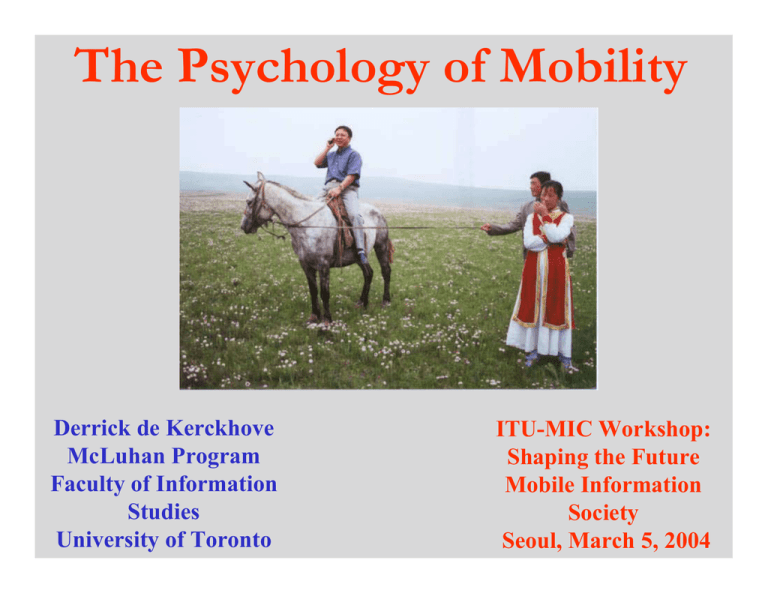The Psychology of Mobility Derrick de Kerckhove McLuhan Program Faculty of Information
advertisement

The Psychology of Mobility Derrick de Kerckhove McLuhan Program Faculty of Information Studies University of Toronto ITU-MIC Workshop: Shaping the Future Mobile Information Society Seoul, March 5, 2004 The three eras of mobility Why mobility is destiny • The need and the drive towards autonomy (technical “weaning”) • An ever greater independence of movement and place • “just-in-time everything” (permanent as well as instant gratification) • A better use of the available time and even of some of the “down-time” • Accelerated lives (a perhaps more dubious benefit) The hidden ground Electricity The cellular phone is but one of the extensions of our central nervous system in the electronic grid of the world • 1834: Electricity weds the alphabet • Telegraph = Language accelerated, amplified, redistributed by electricity • Maximum speed multiplying and distributing maximum complexity • Relentless refinement of the code from the 26 letters of the alphabet to 0/1 via Morse’s “long, short, naught” • O/1 becomes the smallest common denominator of all our experiences, physical and mental (actual and virtual) The technobiology of electricity • Electricity is both within and without the human body • In the analogue mode, electricity emulates muscular functions of the body • In the digital mode, it emulates cognition • All digital appliances are extensions of our senses and our communications capabilities • Some of them such as the cell phone bring electric back to the body… The technobiology of wirelessness • Wireless means permanent, ubiquitous access to all our extensions • The cellular phone spells the integration of the whole world within the body of the user • Wearable computing heralds the quasi internalization of this process The technopsychology of mobility Globalization Change of self-image (body-image) Change of scale Change of physical distribution Change of time (macro and micro scales) Living at nanospeed 1600: invention of the 10th of a second 1800: 100th of a second 1850: the millisecond 1950: the microsecond (a millionth of a second) 1965: the nanosecond (a billionth of a second 1970: the picosecond ( a thousandth of a billionth of a second 1990: The femtosecond (a millionth of a billionth of a second) 2001: the attosecond, that is, precisely a billionth of a billionth of a second The message of mobility: an entirely different way of being in the world The body electric Steve Mann Three cyborgs Stelarc Kevin Warwick Steve Mann sends what his eyetap sees to the web…permanently Whatever he is looking at goes on line for anyone to see Stelarc connects his CNS to someone else’s via the www Warwick implants sensors for contextual cues from the environment A change of mind mind Private Individual Internalized Narratized Causal Theory Page Silent Reflexive (skin) Linear Connected Group Externalized Navigated Sampled Process Screen Semi-oral Interactive Hypertextual Hypertextual thinking Your horoscope The I Ching Palabra, dreaming, prayer, simulation Hypertextual thinking an issue of time, not space: – The only time that counts is NOW – All links and connections are made in REAL TIME – All simulations are manner of prediction (pregestual) Under electronic conditions, the delay between project and realization is shortening Mind-machine-direct-connect • The image as close to thought as possible • Closing the gap between the mind and external I-P • Every move, every glance a command (hand/ eye/brain ratio) • Emigration of mind from head to screen Mark Ngui Digital persona Digital persona • The digital persona is a model of the individual established through the collection, storage and analysis of data about that person. • (It is) intended for use as a proxy for the individual (Roger Clarke). Digital persona • Projected versus imposed • Formal versus informal • Passive versus active versus autonomous • Private versus public Digital community: blogging The blog is the soul of the cyborg A connected psychology A projected chosen self image A community of interest A new digital community “Publicy” We are immersed into a data matrix YESTERDAY’S DOG JOKE TODAY’S DOG JOKE The big trade-off: If you have access to everything it means that… …everything has access to you Anytime, anywhere, always on… The paradox: even as we cut the umbilical cord, we get the matrix in your face Anxieties over civil liberties HOMELAND SECURITY National Governors Association Prevention and Response • Critical infrastructure protection • Cyber security • First responder support • Preparedness training • Incident monitoring and response Citizen Interaction • Public awareness & reporting • Education • Alert systems Information Sharing and Data Exchange • Regional intergovernmental information exchange • Decision support • Real-time information • Interoperability The NGA Center for Best Practices developed the Solutions Toolkit in cooperation with its Corporate Fellows eGovernance Advisory Group. Anxieties over leaking identity The Bourne Identity Dataveillance « The more they know about you, the less you exist » (McLuhan) Identity verification and management in the datasphere (Shannon Smith) • Biometrics (fingerprints, retina, smell, face & voice) • Digital Cash • Prepaid Services • VPNs • Smartcards • Virtual Desktop • Policy/Legal • Passwords • Copyright • Privacy • Passports/Visa • Drivers License • Corporate, National, Global ID • Total Information Awareness • Personal Information Audit • Surveillance Organizations • IBM, HP, Logitec, TI • ATT/BT/FT/DT • big banks • EFF.org • Mobotix • Schlumberger • EU / USA / China • Japan / Interpol • / FBI / CIA / NSA The eye of the medieval God The bigger question: is transparency destiny ? For there is nothing hid, which shall not be manifest; neither was anything kept secret, but that it should come abroad. (Mark 4:22)


